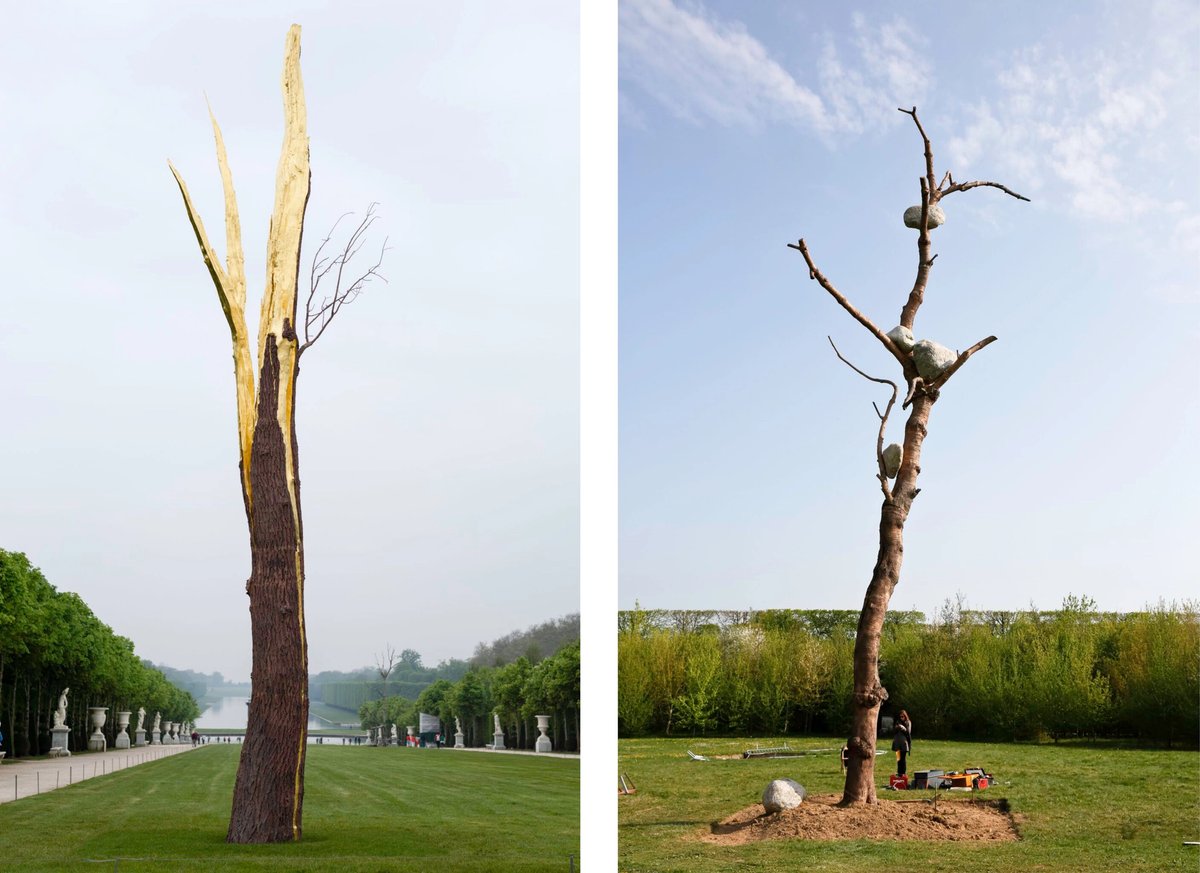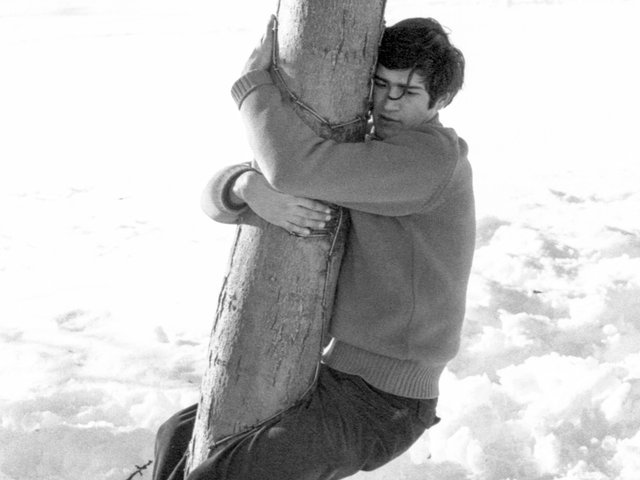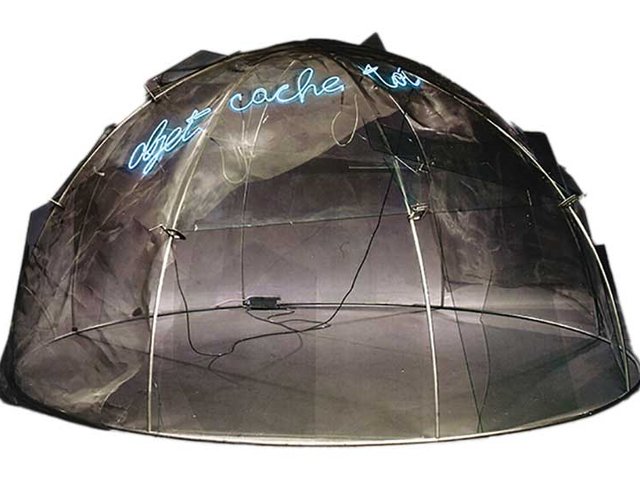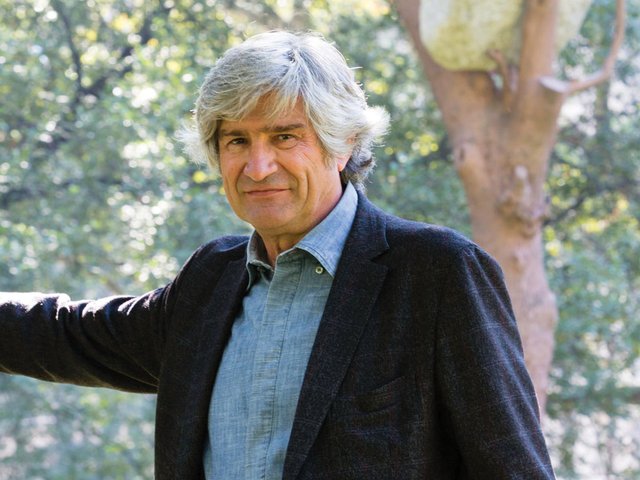In an exhibition billed as his largest in the UK to date, Giuseppe Penone is bringing the verdant Royal Parks of London into Serpentine South—and vice versa. With Thoughts in the Roots (3 April-7 September), a show of sculptures and works that spill out of the gallery into the surrounding greenery, the Italian artist says he will “perceive the space of the Serpentine as a continuum with the nature of the park that surrounds it”.
Works outside include Albero Folgorato (Thunderstruck Tree, 2012), a dramatic depiction of a willow tree struck by lightning, its open bronze carcass splashed with gold. Such pieces dovetail with those on show inside the gallery, such as Respirare l’ombra (To Breathe the Shadow, 1998), an immersive experience comprising a swathe of laurel leaves wrapped around the gallery walls.
“When we speak, we breathe, we exhale, we move the air when we breathe. The breath itself is a form that we do not see,” Penone tells The Art Newspaper. “It was the idea of making it obvious, of indicating this action—breathing which accompanies us throughout life and which can also be seen as a form of sculpture.”
Another work in the gallery is A Occhi Chiusi (With Eyes Closed, 2018). The artist describes the work, which includes a marble piece between two thorny canvases covered in “veins” as “an impression of closed eyes drawn with acacia thorns”.“These are elements that we perceive as something that can pierce the skin and become very sensitive,” he continues.
Intimacy and nature
Penone reiterates how the experience at the Serpentine is unique. “It's like a continuation of the walk outside… the park is huge, but one can still find a kind of intimacy with the elements of nature, something that one does not have at Versailles [where he had a show in 2013].”
Other key pieces include Gesti Vegetali (Vegetal Gestures, 1982-today), which fuses the human form with plants, and the external piece Idee di Pietra-Ciliegio (Ideas of Stone-Cherry Tree, 2011), a feat of engineering whereby boulders delicately nestle in tree branches.
Penone’s attitude to enlarging his audience via joggers, walkers and passers-by in the park, is philosophical. “Everyone in the park can see the works. This is a good thing; if the work is of interest to people passing through the park, it may be an indication that the work can have a life of its own in time and in space,” he explains.
“The work is interesting over time, surpassing the life of the [individual] who made it. This idea of survival is present in art because you make an object that is intended to endure over time,” he adds.
From Switzerland to Saudi Arabia
Penone has been shaping and engaging with natural forms and materials for over 50 years, working with timber, stone, water and even vegetables. In his 20s, he began working in the woods near Garessio, the Piedmontese town of his childhood, creating Alpi Marittime (Maritime Alps), a piece comprising a sapling whose trunk was gripped by a steel hand. From these austere, auspicious beginnings—in 1968 aged 21, Penone was dubbed the youngest member of the Arte Povera group—the sculptor has planted his works worldwide from Gstaad in Switzerland to Dhahran in Saudi Arabia.
“I spent my childhood in a mountain village, connected to nature. My interest was sculpture. I enrolled at the School of Fine Arts in Turin (Accademia di Belle Arti), and I saw that it didn't match what I had imagined,” he recalls.
“The school and I thought that if I could do something individual, it had to be based on my identity. That's how I thought of starting to work with wood, with the growth of trees. And I did those works in 1968.”
Meeting the late Italian art critic Germano Celant in the mid 1960s was a turning point for Penone. “In his career-long investigation of Arte Povera—the artistic phenomenon he had, in fact, christened—Celant described artists as ‘alchemists’ and ‘nomads’, who conduct ‘guerilla warfare’ against accepted norms, styles and institutions,” wrote the art historian Nancy Spector in 2020.
In 1967, Celant organised the defining exhibition Arte Povera—IM Spazio at Galleria La Bertesca in Genoa. “Celant was a young man who had understood that there were many things that were changing in the art world. He had asked the artists for a contribution… he gathered all his contributions and wrote a short text. It was rather a realisation of the work that was being developed in this world,” reflects Penone.
The logic of the art world
Curators today continue to mine the movement. Indeed, a major survey of Arte Povera opened last autumn at the Bourse de Commerce (Pinault Collection) in Paris and closed last month. Penone has mixed feelings about such exhibitions today.
“An exhibition on Arte Povera, with works from the 1960s, is complicated today because we are used to seeing big works and large installations in large spaces. At the time there were not these conditions. These were works that had a [smaller] domestic dimension.”
He adds: “There is also the issue of the audience. In the 1960s, nobody was going to see contemporary art. There was a very limited audience, and there was also little concern about causing damage to the works
“Today, there is a whole system that has become heavy, also from the point of view of [viewing the works]. This forces us to follow forms that are created, not by the logic of the work, but by the logic of the [art world] economy.”
Penone is obviously tuned in to the natural world, so is he aware of environmental concerns? “I do not work with this concern [in mind], in the sense that I do not want to create critical works because I am doing a job based in this historical moment. Man has an interest in preserving the planet for his own survival.”
Finally, what motivates him? “If the thought I have is interesting, and if the curiosity I have about the subject matter continues to astound, it will be interesting for others. But I don't associate political or social motivations with the work, because I find that to be demagoguery, which is always in contrast with the idea of poetry.”
- Thoughts in the Roots, Serpentine South, London, 3 April-7 September





